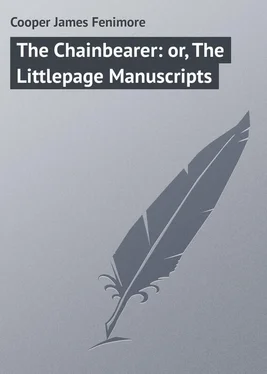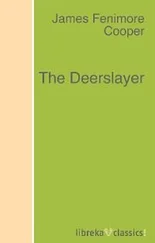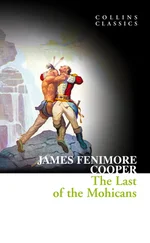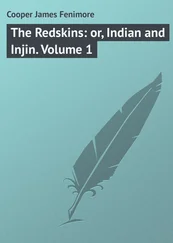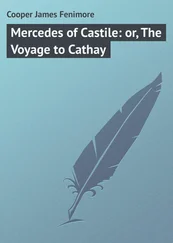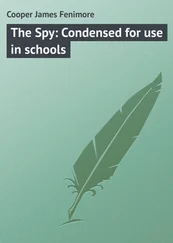James Cooper - The Chainbearer - or, The Littlepage Manuscripts
Здесь есть возможность читать онлайн «James Cooper - The Chainbearer - or, The Littlepage Manuscripts» — ознакомительный отрывок электронной книги совершенно бесплатно, а после прочтения отрывка купить полную версию. В некоторых случаях можно слушать аудио, скачать через торрент в формате fb2 и присутствует краткое содержание. Жанр: foreign_prose, на английском языке. Описание произведения, (предисловие) а так же отзывы посетителей доступны на портале библиотеки ЛибКат.
- Название:The Chainbearer: or, The Littlepage Manuscripts
- Автор:
- Жанр:
- Год:неизвестен
- ISBN:нет данных
- Рейтинг книги:5 / 5. Голосов: 1
-
Избранное:Добавить в избранное
- Отзывы:
-
Ваша оценка:
- 100
- 1
- 2
- 3
- 4
- 5
The Chainbearer: or, The Littlepage Manuscripts: краткое содержание, описание и аннотация
Предлагаем к чтению аннотацию, описание, краткое содержание или предисловие (зависит от того, что написал сам автор книги «The Chainbearer: or, The Littlepage Manuscripts»). Если вы не нашли необходимую информацию о книге — напишите в комментариях, мы постараемся отыскать её.
The Chainbearer: or, The Littlepage Manuscripts — читать онлайн ознакомительный отрывок
Ниже представлен текст книги, разбитый по страницам. Система сохранения места последней прочитанной страницы, позволяет с удобством читать онлайн бесплатно книгу «The Chainbearer: or, The Littlepage Manuscripts», без необходимости каждый раз заново искать на чём Вы остановились. Поставьте закладку, и сможете в любой момент перейти на страницу, на которой закончили чтение.
Интервал:
Закладка:
"Dere, old Sus," exclaimed the negro, shaking the last of the dead birds from the bag – "dere, now, Injin; I s'pose you t'inks 'em ere's game!"
"What you call him, eh?" demanded the Onondago, eyeing the negro sharply.
"I doesn't call 'em game a bit, redskin. Dem's not varmint, n'oder; but den, dem isn't game. Game's game, I s'pose you does know, Sus?"
"Game, game – good. T'at true – who say no?"
"Yes, it's easy enough to say a t'ing, but it not so berry easy to understan'. Can any Injin in York State, now, tell me why pigeon isn't game?"
"Pigeon game – good game, too. Eat sweet – many time want more."
"Now, I do s'pose, Trackless" – Jaap loved to run through the whole vocabulary of the Onondago's names – "Now, I do s'pose, Trackless, you t'ink tame pigeon just as good as wild?"
"Don't know – nebber eat tame – s'pose him good, too."
"Well, den, you s'poses berry wrong. Tame pigeons poor stuff; but no pigeon be game. Nuttin' game, Sureflint, dat a dog won't p'int, or set. Masser Mordaunt h'an't got no dog at de Bush or de Toe, and he keeps dogs enough at bot', dat would p'int a pigeon."
"P'int deer, eh?"
"Well, I doesn't know. P'raps he will, p'raps he won't. Dere isn't no deer in Westchester for us to try de dogs on, so a body can't tell. You remem'er 'e day, Sus, when we fit your redskins out here, 'long time ago, wit' Masser Corny and Masser Ten Eyck, and ole Masser Herman Mordaunt, and Miss Anneke, and Miss Mary, an' your frin' Jumper? You remem'er dat , ha! Onondago?"
"Sartain – no forget – Injin nebber forget. Don't forget friend – don't forget enemy."
Here Jaap raised one of his shouting negro laughs, in which all the joyousness of his nature seemed to enter with as much zest as if he were subjected to a sort of mental tickling; then he let the character of his merriment be seen by his answer.
"Sartain 'nough – you remem'er dat feller, Muss, Trackless? He get heself in a muss by habbing too much mem'ry. Good to hab mem'ry when you told to do work; but sometime mem'ry bad 'nough. Berry bad to hab so much mem'ry dat he can't forget small floggin'."
"No true," answered the Onondago, a little sternly, though a very little; for, while he and Jaap disputed daily, they never quarrelled. "No true, so. Flog bad for back."
"Well, dat because you redskin – a color' man don't mind him as much as dis squab. Get use to him in little while; den he nuttin' to speak of."
Sureflint made no answer, but he looked as if he pitied the ignorance, humility, and condition of his friend.
"What you t'ink of dis worl', Susquesus?" suddenly demanded the negro, tossing a squab that he had cleaned into a pail, and taking another. "How you t'ink white man come? – how you t'ink red man come? – how you t'ink color' gentl'em come, eh?"
"Great Spirit say so – t'en all come. Fill Injin full of blood – t'at make him red – fill nigger wit' ink – t'at make him black – pale-face pale 'cause he live in sun, and color dry out."
Here Jaap laughed so loud that he drew all three of Chainbearer's blacks to the door, who joined in the fun out of pure sympathy, though they could not have known its cause. Those blacks! They may be very miserable as slaves; but it is certain no other class in America laugh so often, or so easily, or one-half as heartily.
"Harkee, Injin," resumed Jaap, as soon as he had laughed as much as he wished to do at that particular moment – "Harkee, Injin – you t'ink 'arth round, or 'arth flat?"
"How do you mean – 'arth up and down – no round – no flat."
"Dat not what I mean. Bot' up and down in one sens', but no up and down in 'noder. Masser Mordaunt, now, and Masser Corny too, bot' say 'arth round like an apple, and dat he'd stand one way in day-time, an' 'noder way in night-time. Now, what you t'ink of dat, Injin?"
The Trackless listened gravely, but he expressed neither assent or dissent. I knew he had a respect for both my father and myself; but it was asking a great deal of him to credit that the world was round; nor did he understand how one could be turned over in the manner Jaap pretended.
"S'pose it so," he remarked, after a pause of reflection – "S'pose it so, den man stand upside down? Man stand on foot; no stand on head."
"Worl' turn round, Injin; dat a reason why you stand on he head one time; on he foot 'noder."
"Who tell t'at tradition, Jaap? Nebber heard him afore."
"Masser Corny tell me dat, long time ago; when I war' little boy. Ask Masser Mordaunt one day, and he tell you a same story. Ebberybody say dat but Masser Dirck Follock; and he say to me, one time, 'it true, Jaap, t'e book do say so – and your Masser Corny believe him; but I want to see t'e worl' turn round, afore I b'lieve it.' Dat what Colonel Follock say, Trackless; you know he berry honest."
"Good – honest man, colonel – brave warrior – true friend – b'lieve all he tell, when he know ; but don't know ebberyt'ing. Gen'ral know more – major young, but know more."
Perhaps my modesty ought to cause me to hesitate about recording that which the partiality of so good a friend as Susquesus might induce him to say; but it is my wish to be particular, and to relate all that passed on this occasion. Jaap could not object to the Indian's proposition, for he had too much love and attachment for his two masters not to admit at once that they knew more than Colonel Follock; no very extravagant assumption, by the way.
"Yes, he good 'nough," answered the black, "but he don't know half as much as Masser Corny, or Masser Mordaunt. He say worl' isn't round; now, I t'ink he look round."
"What Chainbearer say?" asked the Indian, suddenly, as if he had determined that his own opinion should be governed by that of a man whom he so well loved. "Chainbearer nebber lie."
"Nor do Masser Corny, nor Masser Mordaunt?" exclaimed Jaap, a little indignantly. "You t'ink, Trackless, e'der of my massers lie!"
That was an accusation that Susquesus never intended to make; though his greater intimacy with, and greater reliance on old Andries had, naturally enough, induced him to ask the question he had put.
"No say eeder lie," answered the Onondago; "but many forked tongue about, and maybe hear so, and t'ink so. Chainbearer stop ear; nebber listen to crooked tongue."
"Well, here come Chainbearer he self, Sus; so, jist for graterfercashun, you shall hear what 'e ole man say. It berry true, Chainbearer honest man, and I like to know he opinion myself, sin' it isn't easy, Trackless, to understan' how a mortal being can stan' up, head down!"
"What 'mortal being' mean, eh?"
"Why, it mean mortality, Injin – you, mortality – I, mortality – Masser Corny, mortality – Masser Mordaunt, mortality – Miss Anneke, mortality – ebberybody, mortality; but ebberybody not 'e same sort of mortality! – Understan' now, Sus?"
The Indian shook his head, and looked perplexed; but the Chainbearer coming up at that moment, that branch of the matter in discussion was pursued no farther. After exchanging a few remarks about the pigeons, Jaap did not scruple to redeem the pledge he had given his red friend, by plunging at once into the main subject with the Chainbearer.
"You know how it be wid Injin, Masser Chainbearer," said Jaap – "'Ey is always poor missedercated creatur's, and knows nuttin' but what come by chance – now here be Sureflint, he can no way t'ink dis worl' round; and dat it turn round, too; and so he want me to ask what you got to say about dat matter?"
Chainbearer was no scholar. Whatever may be said of Leyden, and of the many, very many learned Dutchmen it had sent forth into the world, few of them ever reached America. Our brethren of the eastern colonies, now states, had long been remarkable, as a whole, for that "dangerous thing," a "little learning;" but I cannot say that the Dutch of New York, also viewed as a whole, incurred any of those risks. To own the truth, it was not a very easy matter to be more profoundly ignorant, on all things connected with science, than were the mass of the uneducated Dutch of New York, in the year of our Lord one thousand seven hundred and eighty-four. It made little difference as to condition in life, unless one rose as high as the old colonial aristocracy of that stock, and an occasional exception in favor of a family that intended to rear, or had reared in its bosom a minister of the gospel. Such was the strength of the prejudice among these people, that they distrusted the English schools, and few permitted their children to enter them; while those they possessed of their own were ordinarily of a very low character. These feelings were giving way before the influence of time, it is true; but it was very slowly; and it was pretty safe to infer that every man of low Dutch extraction in the colony was virtually uneducated, with the exception of here and there an individual of the higher social castes, or one that had been especially favored by association and circumstances. As for that flippant knowledge, of which our eastern neighbors possessed so large an amount, the New York Dutch appeared to view it with peculiar dislike, disdaining to know anything, if it were not of the very best quality. Still, there were a few to whom this quality was by no means a stranger. In these isolated cases, the unwearied application, painstaking industry, cautious appreciation of facts, and solid judgment of the parties, had produced a few men who only required a theatre for its exhibition, in order to cause their information to command the profound respect of the learned, let them live where they might. What they did acquire was thoroughly got, though seldom paraded for the purposes of mere show.
Читать дальшеИнтервал:
Закладка:
Похожие книги на «The Chainbearer: or, The Littlepage Manuscripts»
Представляем Вашему вниманию похожие книги на «The Chainbearer: or, The Littlepage Manuscripts» списком для выбора. Мы отобрали схожую по названию и смыслу литературу в надежде предоставить читателям больше вариантов отыскать новые, интересные, ещё непрочитанные произведения.
Обсуждение, отзывы о книге «The Chainbearer: or, The Littlepage Manuscripts» и просто собственные мнения читателей. Оставьте ваши комментарии, напишите, что Вы думаете о произведении, его смысле или главных героях. Укажите что конкретно понравилось, а что нет, и почему Вы так считаете.
